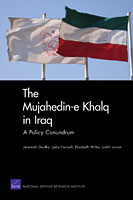RAND National Defense Research Institute Corporation has published a comprehensive report on MEK in 2009. It may be considered the official position taking of the US toward MKO as a supplement to the statements of the US state department in 1997 as well as that of April 2009. All these reports focus on terrorist nature of the organization as a cult of personality. 
MEK leader Maryam Rajavi has established a "cult of personality." 1
The fact is that the US has failed to refer to a novel point regarding the organization in these statements yet has reiterated the analyses and viewpoints of separated members as well as political opposition trends that have managed to reveal some facts on the organization for more than two decades. However, the efforts made by the US to develop a realistic comprehension of NKO imply the well-intentioned inclination of the US in investigating the true nature of Mojahedin.
This article aims to elaborate on some ambiguities found in RAND report including the offered solution of repatriating MKO members to Iran. First of all it has to be pointed out that according to international bodies Mojahedin are an unknown group whose understanding depends on learning lessons from past experiences to avert the danger arising from MKO and other similar groups. According to the statements made by the US:
MEK leadership and members across the world maintain the capacity and will to commit terrorist acts in Europe, the Middle East, the United State, Canada, and beyond. 2
Therefore, finding solutions for avoiding the threat of such a terrorist group needs a full investigation. The more unknown an issue, the more study is necessary for its understanding.
Likewise, solutions proposed for escaping the danger of Mojahedin have to be of novel and unique nature. The solutions offered in RAND report are rarely feasible and also some result in the development of the organization. Surprisingly enough, it seems that the authors of the report aim mainly at shifting their own responsibility for providing a clear explanation of the reality onto other organs and bodies; as it was done by the US in neglecting its responsibility for eliminating the risk posed by Mojahedin in Iraqi soil and further putting the responsibility of making the final decision for the organization on the Iraqi government. However, it seems that Americans care not about the illegal actions of Mojahedin in Iraq.
Despite the focus of RAND report on the necessity of prosecuting and trying MKO leaders, it refrains to refer to this issue in its conclusions. It is not clear why the position taking of Iraqi government against MKO has been questioned in this report in spite of the fact that according to the constitution and sovereignty of Iraq, Iraqi government is rightful to maintain the interests of its citizens by fighting against those breaking its national rules. Another point to be noted is the issue of repatriating MKO members to Iran. According to the report:
Each MEK member who has been granted amnesty by the IRI should be repatriated to Iran. 3
A point confirmed by the following statement:
To date, however, there is no evidence that Iran has failed to honor its offer of amnesty for the former MEK members who have already returned to the country.4
However, the authors refuse to refer to the individual, voluntary and willful nature of the repatriation of a number of MKO members to Iran. This claim is made in a condition when the US has already acknowledged to the lack of public support and legitimacy for Mojahedin in Iran:
Following its participation in the 1979 Islamic Revolution, the group rapidly fell out of favor with the Iranian. 5
It is not clear if RAND report has taken a realistic and practical viewpoint when referring to Iran as the main alternative for giving refuge to MKO members. As it is put into words:
All evidence indicates that no country other than Iran will accept the group. 6
The question is that how a group failing to win the support of even one country in taking its members as political refugees suffering a lack of social support may be repatriated to Iran where according to the same report:
However, once it settled in Iraq and fought against Iranian forces in alliance with Saddam, the group incurred the ire of the Iranian people. 7
It is evident that the US is far from developing a realistic viewpoint and a clear position toward MKO failing to grasp its true nature and consequently resort to conservative policies in dealing with the organization. The solutions given in RAND report fail to solve the challenges met by Mojahedin and also refrain to decrease the potential fear of Mojahedin felt by the US.
The best way for ending the present crises is taking appropriate and feasible procedures for overcoming a group that according to the US is unreliable, incredible, unknown, deceptive and perverse. However, the US has never made an attempt to make Mojahedin submit to international rules and conventions nor withdraw its illegal claims against Iraqi government and its sovereignty.
References:
1. The US State Department’s statement, April 2007.
2. ibid.
3. The report made by RAND National Defense Research Institute on MKO, www.rand.org.
4. ibid.
5. The US State Department’s statement, April 2007.
6. The report made by RAND National Defense Research Institute on MKO, www.rand.org.
7. ibid.

